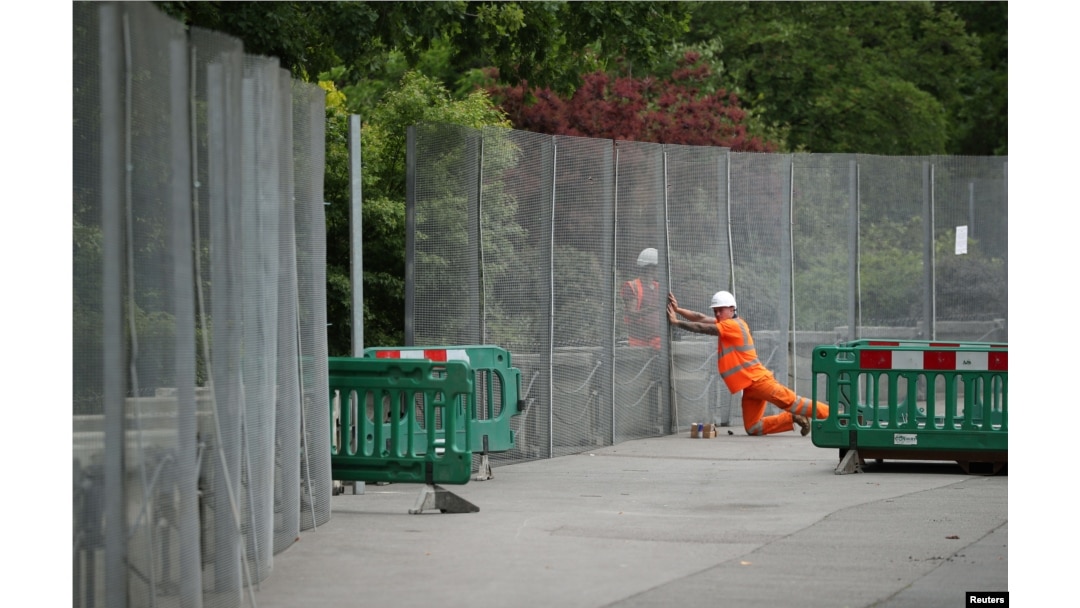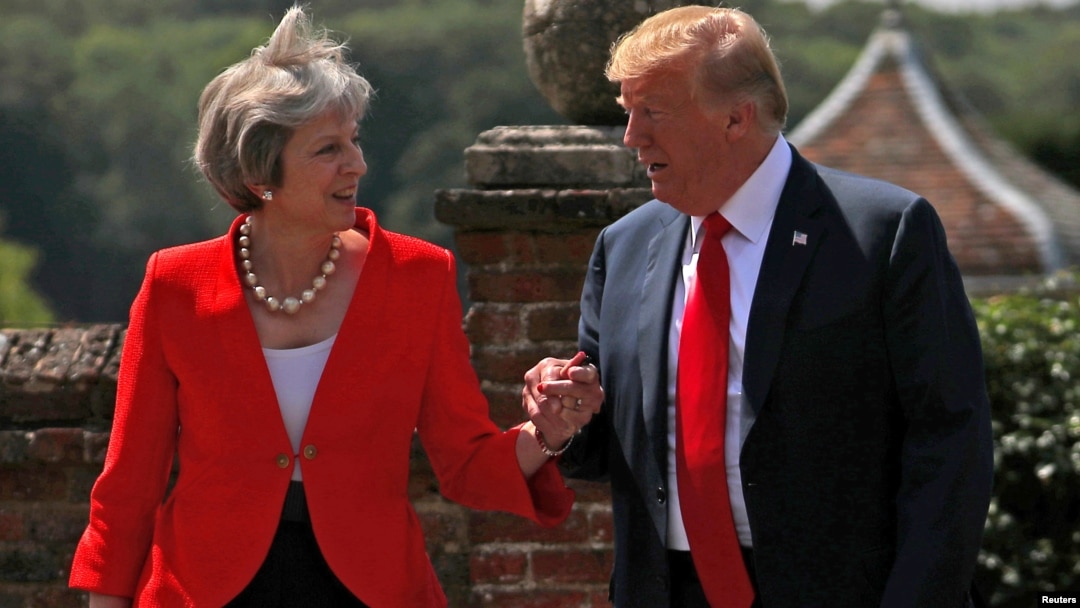U.S. President Donald Trump and Britain’s Theresa May will want a strife-free, three-day state visit to London for the American leader starting Monday, their aides say.
To reduce the possibility of mishaps, with protesters getting too close to the American leader, the traditional ride in a horse-drawn carriage down the tree-lined Mall to Buckingham Palace for visiting heads of state has been axed — although Trump’s predecessor, Barack Obama, also dropped the jaunt because of “security concerns.”
A huge London police operation is being planned to try to ensure the state visit goes off without a hitch.

Workmen construct fences ahead of the U.S. presidential visit, around the U.S. ambassador's residence in Regent's Park in London, May 31, 2019.
Other risks to contain
But aside from protests, there will be other risks on this presidential trip that British officials are keen to contain as they press the U.S. leader for more details on a possible post-Brexit trade deal, and as they seek to ease strains in what British politicians especially like to dub the “special relationship” between Britain and the U.S.
London and Washington are at odds on a range of global issues, including climate change, policy toward Iran and Britain’s trade dealings with China.
The differences haven’t been helped by the lack of personal chemistry between the two leaders; Trump once complained May was too “politically correct,” triggering a transatlantic spat, and his aides have confided in the past that her “school mistress” manner makes the U.S. leader bristle. The two leaders have clashed publicly over several of Trump’s tweets, and in 2018 the U.S. President declined to have a one-on-one meeting with her at the G7 summit.
The U.S. leader’s free-wheeling style contrasts with May’s cautious, risk-averse and detail-oriented approach.
Like many of her European counterparts, she’s found it hard to know how to react to a U.S. leader who largely sees foreign policy as a zero-sum game and is unsentimental about America’s traditional alliances, admits a Downing Street aide.
FILE - Former British Foreign Secretary Boris Johnson, who is running to succeed Theresa May as prime minister, leaves his home in London, May 30, 2019.
Looking beyond May
Not that the U.S. president is spoiling for a fight on this trip, say U.S. officials, or eager to wage an ideological skirmish, as he did nearly a year ago at a NATO summit, where he shook up Europeans as he berated them over greater alliance burden-sharing.
But Trump appears now to be looking beyond the Brexit-fouled May, who will leave office shortly after his trip. He’s unlikely to hold back on offering a norm-breaking running commentary about the British Conservative leadership race or repeating his lavish praise Saturday of key British Brexiters Boris Johnson and Nigel Farage. Johnson is running to succeed Theresa May, and Farage, leader of the Brexit Party, is soon to run for a seat in the House of Commons.
Although there’s nothing listed in the official schedule, Trump has raised the possibility of meeting both men privately this week, possibly at a dinner at the U.S. envoy’s residence in central London, in what diplomats say would be a breach of convention. In an interview with Britain’s Sun newspaper Trump shied away from formally endorsing Johnson but made clear he was his favorite, saying Johnson is a “very good guy” and would be an “excellent” prime minister.
FILE - White House national security adviser John Bolton talks to reporters about Venezuela, in Washington, May 1, 2019.
Asked by Britain’s Sky News whether Trump should refrain from praising Brexit leaders during a politically charged time in Britain, which is split down the middle over whether to exit the European Union or not, U.S. national security adviser John Bolton said: “The president will do what the president wants.”
Some analysts in London have speculated that Trump will urge Johnson and Farage to forge a political pact.
In this photo released by the official website of the office of the Iranian Presidency, President Hassan Rouhani speaks during a ceremony commemorating "National Day of Nuclear Technology," in Tehran, Iran, April 9, 2019.
Iran nuclear deal
Aside from Brexit, President Trump will be pressing for British support in his escalating standoff with Iran, U.S. officials say.
So far the British government has sided with the other major European powers in their efforts to bypass U.S. sanctions on Iran in an effort to preserve the 2015 Iran nuclear deal authored by Barack Obama, an agreement President Trump withdrew from last year, arguing it had failed to restrict Iran from waging foreign wars or backing international terrorism.
According to Nile Gardiner, a former aide to Margaret Thatcher and now an analyst at the Heritage Foundation, a Washington-based think tank, May’s opposition to Trump’s Iran strategy “has damaged the U.S.-U.K. alliance.”
He — as some Brexit-favoring aides of the U.S. president, as well as Conservative Euro-skeptics in London — believes some of the policy differences between London and Washington are the consequence of Britain being pulled in two directions between Europe and the U.S.— a state of affairs he hopes will end if Britain exits the EU.
But it isn’t clear that would be the case, say other analysts. Most senior British policymakers, regardless of whether they’re pro-EU or are Brexiters, share European qualms about the U.S. leader’s approach to Iran, and also are critical of Trump’s withdrawal of the U.S. from the Paris climate accord.
Leaving EU? Still neighbors
Further, whether Britain is a member or not of the EU, they say, the country’s future would continue post-Brexit to be intertwined with fellow European nations.
“The irony of Brexit is that the U.K. will end up having Europe as its principle external relationship in the future,” Robin Niblett, director of Chatham House, said last week at an event at the London-based think tank.
At the same event, former British prime minister, John Major, said: “Europe’s success matters to us, because whether we are part of the European Union or not, they are our biggest neighbor, their security and our security are inextricably linked, and we need the best possible relationship with them.”
WATCH: Pompeo Seeks Common Ground on Iran, Huawei in Europe
Your browser doesn’t support HTML5
Pompeo Seeks Common Ground on Iran, Huawei in Europe
China and Huawei
Another source of dispute that will likely feature in behind-the-scenes bilateral discussions in London this week will be whether the West should confront China. British officials expect Trump and his top aides to push hard for a reversal in a provisional British decision to allow Chinese telecom giant Huawei to develop Britain’s fifth-generation (5G) mobile phone network.
U.S. officials fear Beijing will use Huawei, which ultimately is answerable to the Chinese government, to eavesdrop and to sweep up data passing through Britain’s 5G network. The prospect is alarming to U.S. security chiefs, who fear Chinese spies will be able to penetrate, via Britain’s 5G, American communication networks and capture intelligence shared with Britain.
On a visit last month to London, America’s top diplomat, U.S. Secretary of State Mike Pompeo, bluntly warned British officials against allowing Huawei to participate in building Britain’s 5G network, cautioning them that the tech giant’s political master Beijing wants “to divide Western alliances through bits and bytes, not bullets and bombs.”
If Britain went ahead, he said, it would put at risk the longstanding intelligence-sharing arrangement London has with Washington.
Pompeo’s threat sent shockwaves through the British establishment.
Intelligence ties bind
Britain is a key member of the so-called Five Eyes alliance, the U.S.-led Anglophone intelligence pact also linking Australia, Canada and New Zealand. Norman Roule, who was in the CIA’s Directorate of Operations for 34 years, and served as a division chief and chief of station, says “the U.S. intelligence relationship with the British is the closest on the planet.”
And for the British it is the foundation stone of the “special relationship.” When relations have soured between individual U.S. presidents and British prime ministers, the transatlantic partnership has endured thanks largely to the tight intelligence-military partnership between London and Washington.
“The U.K.-U.S. relationship is far less about the dynamics between two leaders, and far more about daily interactions between thousands of officials and military personnel who work closely together in person or electronically,” according to a former top British defense official in a commentary for the Royal United Services Institute, Britain’s influential international defense and security think tank.
Of equal concern for Britain’s spy chiefs is another explosive issue which is likely to be raised by the U.S. leader this week about whether Britain’s MI6 foreign espionage service helped the FBI to spy on his presidential campaign, something the president alleges. British officials have denied the charge.


